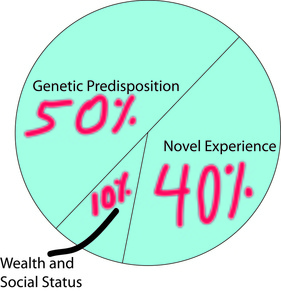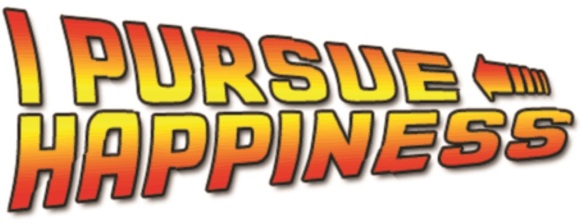One of the fundamental tenants of cognitive behavioral therapy is the ability to weed out irrational thoughts and replace them with thoughts that are more realistic. Chase breaks down the basics.
|
Chase explains why getting a mental health checkup is every bit as critical as routine checkups by your doctor. In our country, we talk quite a bit about social status, wealth, education, material goods... but what is the secret sauce to happiness? Success? Life fulfillment? Are we just born with it? Maybe some people just have bad luck and there's nothing we can do about it. Lead researchers have broken down the determiners of human happiness into three fundamental aspects.  So if we look at this chart we can tell right away that Madonna (the material girl) has it all wrong. Sure there is a percentage that represents the material things in life. But the vast majority of a person's measure of happiness that they can control is how they choose to live their lives. If you are sitting in your house filling sorry for yourself all day you are much less likely to be happy than someone who is out and about stimulating their brains with novel stimuli. Now we also have to deal with the genetics. Sure, if your parents were depressed alcoholics, and their parents were depressed alcoholics, then then the likelihood of you being a depressed alcoholic is pretty high. Likewise, if your parents are in a committed happy relationship, you are much more likely to be a happy person overall. BUT... There is a ton of stuff we can do to stack the deck in our favor. Novel ExperienceTo be very simplistic, your brain has two neurotransmitters that make you feel good: serotonin and domapine. When you are exposed to novel experiences which are enjoyable, your brain releases dopamine. This feels good. Let's look at an example. By any measure, a rollercoaster is a novel situation. There just aren't normal everyday situations where your body is being slung around at high rates of speed. Most of the time you are pretty stationary. Thus, a rollercoaster is an incredibly novel situation for most people. Next time you go to Six Flags (or any theme park for that matter) park yourself outside the exit of a big rollercoaster like this and see if you can spot anyone frowning or arguing with each other. Not gonna happen. Of course, you can't spend money and go to Six Flags all the time, but you are in control of the situations you put yourself in everyday. The old cliche variety is the spice of life is absolutely true. You've got to change things up. Vary your exercise routine, eat something different, call someone you haven't talked to in a while. If you're seeing the same walls, talking to the same people, and doing all the same stuff day after day, you are going to find yourself in a rut. You want dopamine released into your brain? There's two ways to go about that. You can be a drug addict (which we clearly DO NOT recommend) or you can expose yourself to novel experiences. We suggest the latter. Flow
But flow is not just self-awareness. Flow is also the zoning in of your intelligence to whatever it is that you are doing in the moment. It is our highest state of consciousness. When we are in flow, we feel as though nothing else matters, as though we are dominating our experience and nothing else matters. You have probably felt yourself in flow from time to time in your life. When you are in the driveway shooting baskets and can’t miss. When you are singing and hitting every note with perfect pitch. When you are debating and your talking points are on fire. Whatever it is that you enjoy, whether it be knitting or playing racquetball, you’ve felt the force of flow at some point in your life. You’ve certainly seen pro athletes in flow. The pitcher who throws the perfect game. The Michael Jordans of the world who catch fire and dominate their opponents. In these moments, we feel as though everything is easy, as though we were born to do what we are doing. The wonderful thing is, that with proper training and control over your mind, these states of consciousness are reproducible. And when we are in flow, it is not whether we are happy that we are concerned about, it is the moment, the most precious of instances. CommunityFor millions of years, human beings have been a pack type of species. We are at our best when we are around others. Just as our closest kin, the apes, are better off when they are all cooperating and looking out for each other in their troops, humans are much better off when we are cooperating and looking out for each other. Isolation is not good for us. When we interact with people, given the nature of unpredictable consciousness, we are inherently exposed to novel stimuli given that it is inevitable that we are going to be unable to predict exactly how our co-interaction-ers are going to interact with us. The beauty of people and of consciousness is that people have a tendency to always surprise us by the things they do. This unpredictability is what separates us from machine intelligence, though the debate on whether machines will ever catch our intellectual capacity is an article far and away outside the scope of this article. We derive happiness from our interactions with others. So find people that you enjoy being around and hold on to those people with all you got. And prune the people that you don’t enjoy being around. There is no rule that says that you have to be around people you dislike. Being Realistic About LifeHappy people are not happy because nothing bad happens to them. Though some people may have better luck than other, happiness is not based on luck as much as the person’s mindset. Take this example. Let’s say that I finish up typing this article, stand up, and slam my finger in the door. A person who is predisposed to unhappiness may think something along the lines of, why does this type of thing ALWAYS happen to me? Of course that would be a horrible situation. Of course if you ALWAYS were slamming your fingers in the door and snakes were biting you and your family members were always getting into mortal accidents and Santa Claus ALWAYS gives you coal for Christmas, of course that would be a terrible life. But the truth of the matter is that people who are depressed have a significant tendency to deeply overestimate the bad things that happen to them in life while minimizing the good. Let’s look at the exact same example, take the exact same starting situation of slamming our finger into the door, and rephrase our thoughts to reflect the reality of the situation. What is the most realistic way to think about that situation. The person who is most happy will think something along the lines of, ouch, that hurt, but it will heal and then we’re good. How do we feel at this point? Of course, we aren’t celebrating the fact that we just slammed our finger, but looking at the situation more realistically gives us a much brighter outlook than the doom and gloom of the negative person’s always happens to me mantra. So happiness is not just saying, I’m going to start being happy, because we aren’t really that in control of our emotions, or our behavior. BUT, we are in control of our thoughts. Our thoughts are the most important part of this triad, because they are completely within our control. If a situation occurs, and you have a thought that might not be reflective of the reality of the situation, you are always free to take a moment to reevaluate, get a second conscious opinion, and ask yourself if there is a more realistic way to look at the situation. Be careful not to mistake this with being an optimist for optimisms sake. Suppose I give you a car and the windshield is covered with dirt and bird feces. How’s the world going to look? Terrible right? But worse, if your windshield is in this state, you are not going to be a very good driver because you can’t see the world outside your window. Now, let’s say that I take back your car, clean off your mud, and replace it with drawings of rainbows and flower and unicorns and candy canes. How’s the world going to look? Great! Right? Well sure, the world will look pretty rosy, but are you going to be a good driver? Nope. The best driver is going to be the person with the clear window, so that they can see the world out there for what it is. The Positive Paul and the Negative Nancy drivers are going to end up crashing because their view of the world is inhibited. Meanwhile, True Tom is going to lap you. Responding to Adversity Some people have all the luck. But it is entirely possible to be happy even when life deals you deuces. Let’s look at an example. A long time ago, there was a baseball player who played for the New York Yankees. He was one of the greatest lefty's the game has ever seen. He was also one of the most popular players in the history of sports. Fans loved him, and appreciated being able to root for a player they considered a class act. In addition to his many accomplishments, 1927 was a particularly special year. He batted .373 with 218 hit, 52 doubles, 18 triples, 47 home runs, and a then record 175 runs batted in, smashing the previous record held by Babe Ruth. His team went on to sweep the World Series that year. Many consider the 1927 Yankees to be the greatest team of all time. Towards the end of his career, this baseball player begin to stumble. He was no longer putting up superstar numbers, and in fact dwindled to the point where he was only batting a buck 83 with 1 paltry RBI on the season. The baseball player decided to bench himself, because he was angry for not being able to perform at the level he was accustomed to performing. It wasn't long before doctors discovered he had a degenerative disease whose prognosis was fatal. Feeling terrible about the situation, the Yankees scheduled an appreciation day on July 4th, 1939 in honor of this player to a packed Yankee Stadium filled with men, women, children, and the media. He was the first player in sports ever to have his number retired. After some kind words from Babe Ruth, and with not a dry eye in the stadium, the player shoved his hands into his back pockets and without flinching told his friends in The House that Ruth Built that he considered himself “the luckiest man on the face of the earth.” That man was Lou Gehrig. The disease would later be named after him. This is the type of outlook we must instill: the outlook that no matter how grim, even in the face of our own mortality, to look out into the universe and to see the beauty inherent in nature and in order, we as humans should consider ourselves extremely lucky, and it is in the shadow of Lou Gehrig and his bravery facing death we can learn a valuable lesson about our place in the universe. It’s so easy to see the things that we don’t have. It’s all too tempting to look at others’ lives, to look at material possessions and wonder why it is that we are not as blessed. Happiness comes from being able to appreciate what you have in the moment, for the current moment - the real-time realization of reality that you are experiencing right now - is the most important time in your life. Fans, for the past two weeks you have been reading about the bad break I got. Yet today I consider myself the luckiest man on the face of the earth. I have been in ballparks for seventeen years and have never received anything but kindness and encouragement from you fans. Look at these grand men. Which of you wouldn’t consider it the highlight of his career just to associate with them for even one day? Sure, I’m lucky. Who wouldn’t consider it an honor to have known Jacob Ruppert? Also, the builder of baseball’s greatest empire, Ed Barrow? To have spent six years with that wonderful little fellow, Miller Huggins? Then to have spent the next nine years with that outstanding leader, that smart student of psychology, the best manager in baseball today, Joe McCarthy? Sure, I'm lucky. When the New York Giants, a team you would give your right arm to beat, and vice versa, sends you a gift — that’s something. When everybody down to the groundskeepers and those boys in white coats remember you with trophies — that’s something. When you have a wonderful mother-in-law who takes sides with you in squabbles with her own daughter — that's something. When you have a father and a mother who work all their lives so that you can have an education and build your body — it's a blessing. When you have a wife who has been a tower of strength and shown more courage than you dreamed existed — that's the finest I know. So I close in saying that I might have been given a bad break, but I've got an awful lot to live for. Thank you. — Lou Gehrig at Yankee Stadium, July 4, 1939 What Yoda, Jesus, and Buddha All Have in CommonIf you said an aversion to material wealth, you may or may not have won a new car! (disclaimer: you did not just win a new car.) Here’s what the research says about wealth: once your needs are met, you aren’t going to become much happier no matter how much wealth you acquire. As long as you have a roof over your head, food in the pantry, and people around you that matter, you are rich my friend! I recently saw a documentary that included a segment over a man in a third world country whose job was to drag a cart around town by foot while people road in it. This is not a job with a high ceiling or pay grade. He said that a lot of people cursed at him and threw things at him. He said that his feet often hurt (he couldn’t afford shoes) and that his hands were rough with calluses from carrying the cart all day. He was dressed in tattered rags and he lived with his family in a shanty. Yet, when asked, this man called himself “lucky” and referred to himself as “rich.” This was no fool. This guy was not playing to the camera. As someone who evaluates how to make people happy for a living, either he was the best actor in the world (doubtful) or he truly believed that he was the happy. He spoke of counting his blessings: the fact that he lived with his family who loved him and lived in a small shanty community where everyone was friends with each other. We can all learn a lesson from this great man. And the research supports his seemingly insane hypothesis. Once our needs are met, there isn’t a whole lot of difference in terms of happiness between the middle class citizen and the person who is a multimillionaire. Being rich in life is not a condition of the size of your bank account, but of the size of your heart and sense of being part of something in life. ServitudeNo matter your lot in life, whether you are a working at McDonald’s or the president of the United States, your role in life is as a servant. Our best leaders are the ones who do not quest after power, but rather are called to it by others, and those who choose to serve recognize that they are servants of others, that the very best of what it means to be human is to serve your fellow man. We are very lucky here in America. Our great country came into existence through the ideas of the most legendary thinkers of our time. Our framers recognized that not only are our governmental powers, held in the constitution, an extension of our roles as public servants through free elections, but that the dark heart of man lurks. There are those of us who actively search for power, for the sake of power, and that through the unhappiness in their hearts they desire to remake the world in their vision. Our framers recognized this propensity and put significant road blocks in place to prevent this type of person being able to wield too much power if it ever came to be that they came to power. The darkest of us seeks power, while the best of us seeks to serve. No matter what paths your life has traveled, you can always seek to serve your fellow man, and through that servitude you will know joy. Help someone. Teach someone. Praise someone. This is the pursuit of happiness. Chase Chick MPA LPC is CEO and co-founder of Beyond the Gray Sky, whose brands include Pursuit of Happiness, Dallas Psychology Review, and Luxe Media Productions.
 Recent reports suggest that McCready, dead at age 37 from an apparent self inflicted gunshot wound, was recently admitted to a local psychiatric hospital, was held against her will for 48 hours, and then released. Whoops. Imagine you went to a medical hospital with some kind of potentially fatal disease, the hospital clears you and says you are safe to go home, and a couple days later you are dead from the fatal disease. Yep. This, yet another failure of the US mental health care system, is a shining example of what's wrong with mental healthcare in our country. To give a little background, here's how going to the psychiatric hospital works: You initially come in to the lobby and fill out some demographic paperwork with the hopes of being seen promptly. Depending on the night, you could wait up to 10 (sometimes more) hours before anyone will see you. While you wait, you will be in a crammed lobby with other people who have varying types of mental illness. There you will find people actively detoxing from drugs or alcohol for several hours, a clear medical risk by any standard. You will be subject to the safety (or lack thereof) of other patients who may be experiencing auditory command hallucinations to kill people and themselves, security nowhere to be seen. It would not be too uncommon for someone who is actively psychotic to flip out after having to wait for far too long and begin destroying the lobby, putting you and the other patrons of the lobby at risk. Finally, a member of the understaffed and overwhelmed admissions counselors will do a brief (brief because the corporation that runs the hospital doesn't want them to spend too much time with them, because, you know, the wait time for other patients is already out of control among other reasons) assessment searching for admission criteria. Depending on what is going on with you, you may then (after another couple hours worth of waiting) see a psychiatrist. If you are admitted you will go to a fairly run down unit manned by more understaffed and overwhelmed nurses who are already dealing with people who are angry and potentially psychotic. If this displeases you and you act out, you will be held down by techs and receive a "cocktail" which is usually an injection of Haldol, Benadryl, and Ativan and then go to the "quiet room" to calm down. Your therapy will consist of individual therapy with an LPC or LMSW, "rounding" by your psychiatrist, which is a fancy way or saying that they come take a look at you and reccommend medication adjustments, and group therapy, which more often than not involves a group size well past what would be considered therapeutically efficacious. Group therapy often involves watching VHS tapes from the 80's or 90's. Now, let me offer a disclaimer. Not all psychiatric hospitals are like this. But the ones that have been bought out by mega corporations are too often helmed by CEO scrooges that are more concerned with the bottom line than whether or not people are actually receiving sufficient help to improve their outlook. Even when the hospital's intentions are sound, they too often find themselves in a battle with your insurance company over whether or not your continued stay is necessary. So if you were, say, suicidal yesterday but not today, your insurance company may not pay for you to continue to be at the hospital. So your potentially caring and thoughtful psychiatric hospital will be left to choose between keeping you anyway (costing them lots of money and creating the potential for them to go out of business) or follow your insurance company's recommendation of discharging you to outpatient level of care. Your psychiatrist at the hospital does have the option to issue an OPC which stands for Order of Protective Custody. This will keep you in the hospital whether you or your insurance company likes it or not. The problem is that in order to do an OPC, the doctor must feel like you are in imminent danger of harming yourself, harming others, or have deteriorated to the point that you are unable to make an informed decision about your level of care. In the case of Mindy McCready, the most likely situation is that she was admitted to a psychiatric hospital voicing complaints of having suicidal thoughts, and the day those subsided her attending psychiatrist wrote discharge orders and the rest is history. As a society we need to take a hard look at the entirety of our mental healthcare system. Our mental healthcare cannot be beholden to whims of an insurance company who has not laid eyes on you, nor should your care be subject to the desire of a bottom line driven CEO attempting to maximize profits for the mega corporation to which he or she reports. At the end of the day, the patient-provider relationship should be the primary concern. Your healthcare provider should be able to visit with you and make a decision on what they think is the most appropriate level of care and course of treatment. When their livelihoods are tied to outside influences, namely money or the money to be made by the company signing their paychecks, the best interests of the patient is too often compromised. RIP Mindy McCready. Chase Chick MPA LPC is CEO and co-founder of Beyond the Gray Sky, whose brands include Pursuit of Happiness, Dallas Psychology Review, and Luxe Media Productions.
DA14 is just a wee lad. With respect to the size of the Earth, at 149 feet across, DA14 hitting the planet would be comparable to shooting a BB gun at a car. Yet, it passed by without harm last night around 17,000 feet away from the Earth's surface, a very close shave on a cosmic scale. The meteor that exploded over the Ural Mountains in Russa was a third of the size of DA14, yet its explosive force was twenty times more powerful that the atom bomb dropped on Hiroshima in World War II. Its unexpected arrival managed to injure over 1,000 people, damaged structures, and caused panic among the more that 1 million people living in in the city Chelyabinsk. Near Earth Objects, or NEO's in scientific parlance, have a well chronicled history with Earthlings. A couple billion years ago, a mega sized asteroid came to town, crashed into Earth, and became the moon, whose tides were the possible enabler of land based life as we know it on Earth. 65 million (or possibly 66 million according to the latest estimates) the Chicxulub Asteroid made an appearance, and the results were devastating. This mammoth, estimated to be 6 miles across, is believed to have wiped out the dinosaurs and caused mass extinctions for most creatures that were living at the time. But humans owe this asteroid another debt, because it paved the way for mammals to rule the Earth. About 100 years ago, another asteroid, about as large as DA14, exploded in the atmosphere over Siberia, leveling 825 square miles of forest. Yeti everywhere had a tough day. On June 19th, 2004 the scientific community was beside themselves. The Kitt Peak National Observatory had discovered a deadly asteroid named Apophis (named for the Egyptian enemy of Ra, the sun god) which was over 1,000 feet across and carried with it a greater than 1 in 50 chance of striking the Earth in 2029. It was expected to take two shots at us: One on Friday the 13th in April 2029, and another on - again - Friday the 13th of March 2036. Not awesome. The probability of striking the Earth has since been lowered to something like 1 in 10 million, but phew, right? But there is one thing that we know for sure: there is an asteroid out there, its a big boy, and its got our name on it, we just don't know when. What does this have to do with mental health? 1) Like asteroids, mental health problems and suicides are inevitable. It's not a matter of if they are going to happen, but when. 2) Like asteroids, there is a significant number of people out there suffering from mental illness who are undiscovered. These isolated individuals receive no treatment whatsoever and (like the undiscovered asteroid with our name on it) pose the greatest risk. 3) Like asteroids, when mental illness strikes, humans suffer. Similar to the damage done by asteroids that hit in the sea or areas that humans do not inhabit, most sufferers of mental illness suffer alone. But like the meteor that caused terror in Russia, there are a fraction of those with mental illness who are so unstable that they lash out at society, and then society endures murderous rampages that become news darlings. 4) Like asteroids, if we identify mental illness early enough, we can mitigate its damaging effects. It turns out that in most cases, we have a window worth a year or two from the onset of first symptoms to the warranting of a full psychiatric diagnosis. If we treat mental illness early enough the destructive forces - that are often inevitable when left unchecked - become much easier to deal with. Being proactive about preventive mental health services can sometimes be the difference between life and death. 5) Like asteroids, there are little mental illness problems and there are really big mental illness problems. Depression and anxiety are the Russian meteors of the mental health world. They happen quite often, do a little damage, and then they're out of the news cycle. But like Chicxulub whose crater still mars the Yucatan Peninsula, sometimes mental illness can have deadly consequences. 6) Like asteroids, at this point, humanity is simply not doing enough to prevent mental illness. Like asteroids, we wait until something happens, scurry about while pumping rhetoric about how we need to do something, and then slowly forget the dangers and go back to waiting for the next disaster. 7) Like asteroids, there is exactly ONE organization that is doing something. For asteroids, there is the B612 Foundation - named after the asteroid in Antoine de Saint-Exupery's "Le Petit Prince" - whose recommendation to NASA is a $250 million-a-year program cataloging asteroids and developing a deflection plan. B612 is currently operating at $20 million a year. Likewise, Pursuit of Happiness has developed an effective and affordable preventive mental health program which implements mental health checkups in a variety of populations. 8) Like asteroids, humanity needs to get more serious about preventive mental health. The consequences in both cases for doing nothing will take a heavy human toll. Chase Chick MPA LPC is CEO and co-founder of Beyond the Gray Sky, whose brands include Pursuit of Happiness, Dallas Psychology Review, and Luxe Media Productions.
Going to see a psychiatrist or a counselor can be a major step, and for a lot of people, this step can be very daunting. As a result, people will often reach out to someone with whom they are familiar: church leaders, primary care doctors, or perhaps even someone in the family. This is generally not a good idea. Just as you would not hire me to build you a house because even though I can figure out how to lay bricks and stack them, you should not seek out mental health expertise from those are are not mental health experts. The trouble with most people is that they trust those around them. And as a result they tend to lend credence to whatever advice (or potential psychotropic prescription pills) that they may give. This is a bad idea. Too often people go to see their primary care physician and get a prescription for whatever mental health condition ails them. Feeling depressed? Antidepressants should do the trick. Can't focus? How bout some Adderall! This is not helpful for a variety of reason, can be potentially dangerous (such as was the case for this poor kid), and is not dealing with the root of the problem. Let's take depression for example. In most cases, depression happens because something in someone's life is not going the way they want. There are cases where the depression is totally organic and the person feels depressed despite what might otherwise be fantastic life circumstances, but for the majority of our clients depression has a cause which cannot merely be covered up with drugs. The reason for this is simple: the cause is still there in spite of how many pills you take. So what we must do, and what the research informs us to do, is take a more holistic approach. Psychotropic antidepressants can create the capacity for feelings of well being, but it only creates the capacity. The mind must do the rest. That's where psychotherapy comes in. Psychotherapy gets to the root of problems, helps people cope with situations that might be out of their control, and helps them to gain control of situations that are within their capacity for control. When these two approaches are combined (when therapy is practiced by a counselor and medication is practiced by a psychiatrist) we see the greatest potential for the person to break the cycle of depression. The data is very definitive about combining talk therapy with pharmacotherapy in order to see the greatest potential efficacy. There are no shortcuts. Primary care physicians are great, and I do not mean to deride them, but it is beyond the scope of their expertise to attempt to diagnose and treat mental health conditions. Too often they will do it anyway, and this practice must stop. After a recent wealth of mass homicides, we are just now as a nation turning our attention to what many have called a "broken" mental health system. Let me say this: our system isn't broken, but rather, no one has been listening to us. Chase Chick MPA LPC is CEO and co-founder of Beyond the Gray Sky, whose brands include Pursuit of Happiness, Dallas Psychology Review, and Luxe Media Productions.
|
Andres D.
President, Pursuit of Happiness
Chase C.
CEO, Pursuit of Happiness Archives
September 2013
Categories
All
|









 RSS Feed
RSS Feed
